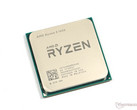The use of Digital Rights Management mechanisms (DRM) is a topic that can elicit passionate responses from both sides of the spectrum. But when it comes to implementing DRM there are definite differences in the impact that it can have on the end user experience (e.g., performance impact when executed poorly).
An example of poor implementation is the newly released Assassin’s Creed Origins where users have taken to forums to complain about high CPU usage out of character with what they had come to expect from a game of this type on their hardware. TorrentFreak linked several Steam Community posts with examples such as:
Now higher usage by itself isn’t necessarily a bad thing, but in these cases those who are at 100 percent are reporting poor performance and stuttering, while those who have less than 100 percent are saying that the lack of headroom is giving stuttering frequently enough to be annoying.
Voksi, a member of the ‘Revolt’ cracking team, told TorrentFreak that after reviewing code from the game’s binaries it was clear that the implementation of DRM was the cause of these performance problems. Denuvo is a popular DRM platform that many publishers use to protect their games in the initial sales window. However, the latest implementations have been cracked at breakneck speeds, with some games having the protection bypassed within hours after release.
But Denuvo by itself doesn’t have an impact on performance significant enough to explain these complaints. Ubisoft appears to be concerned (rightly so) with protecting Assassin’s Creed Origins for more than a few hours after release. To do so, they implemented a second layer from VMProtect on top (which runs software in a virtual machine using a non-standard architecture) to protect Denuvo from crackers.
“This is great if you are looking to save your game from those pirates, because this layer of VMProtect will make Denuvo a lot more harder to trace and keygen than without it” says Voksi. “But if you are a legit customer, well, it’s not that great for you since this combo could tank your performance by a lot, especially if you are using a low-mid range CPU. That’s why we are seeing 100% CPU usage on 4 core CPUs right now for example.”
To be clear, we aren’t advocating game piracy here. These days it is pretty much given that DRM in games will be broken, and it can be measured in ‘how long’ rather than ‘if' (developers of DRM software argue that their goal is to stop piracy in the vital week or two after release). This means that those who are willing to pirate a game will get a chance to do so at some point, regardless of which protection is used.
Paying for the games we play is the most direct way we can support the hobby we love, but DRM that degrades the experience of legitimate customers is DRM done wrong. When the pirates who downloaded a cracked copy of your game for free get a better experience than those who paid, then you know you’ve got a problem.


 Deutsch
Deutsch English
English Español
Español Français
Français Italiano
Italiano Nederlands
Nederlands Polski
Polski Português
Português Русский
Русский Türkçe
Türkçe Svenska
Svenska Chinese
Chinese Magyar
Magyar










